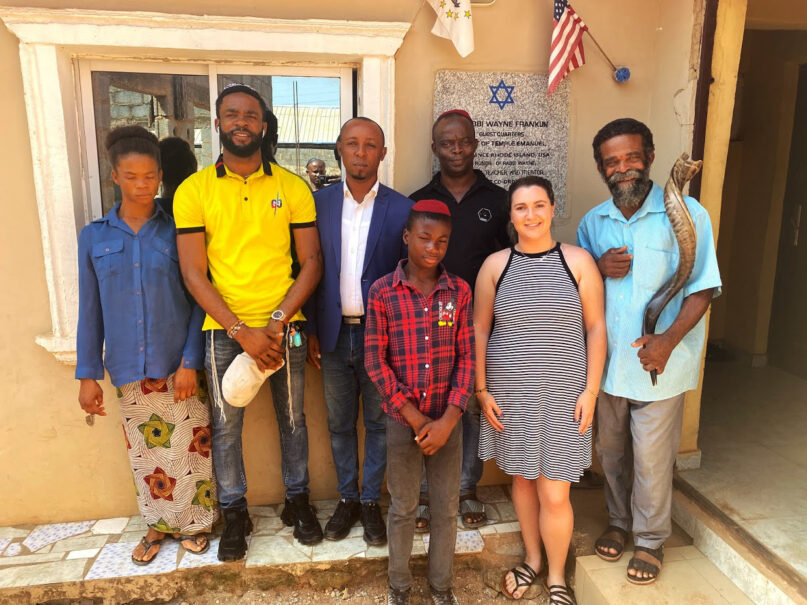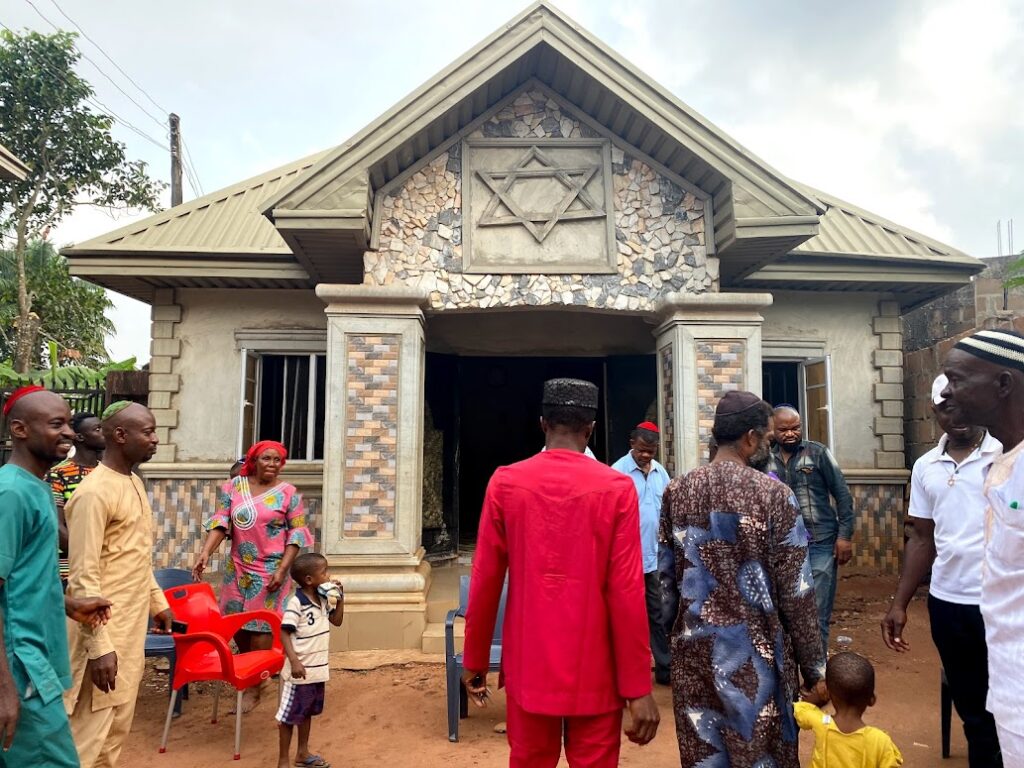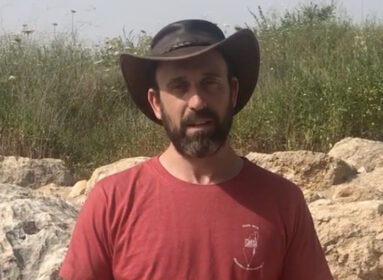
By Stacey Dresner
NEW HAVEN – Earlier this month Rachel Bashevkin and Eric Dunsker packed up four boxes filled with prayer books that had been sitting unused in their synagogue, Congregation Beth El Keser Israel (BEKI) in New Haven. The 90 books – siddurim, machzorim (High Holiday prayerbooks) and chumashim (The Five Books of Moses) – were destined to go to a congregation in need, with the help of Kulanu, an organization that helps “isolated, emerging, and returning Jewish communities” around the world through education, research, networking, and fundraising.
“It’s a shonda [Yiddish for ‘shame’ or ‘disgrace’]to have perfectly usable holy books just sitting in storage, so it’s really a mitzvah,” Bashevkin says. “It’s really incumbent upon us to share these books.”
The donated books were earmarked for Tikvat Israel Synagogue, a congregation numbering approximately 50 members, in the Nigerian village of Kubwa. The volumes weighed a total of 186 pounds.
“Kulanu reaches out to these isolated, emerging congregations in far-flung places of the world and I was really relieved that Kulanu was not asking us to ship the books to Nigeria,” Bashevkin said. “That would have been a challenging expense.”
Instead, Bashevkin was given addresses in Philadelphia and New York where she could send the four boxes of books, each weighing around 46 pounds. Bashevkin was told people would be traveling to Nigeria and carrying the books with them on their trip.
Around that same time, Bashevkin read a story in Hadassah magazine written by Eliana Saks, a production editor at a publishing company in Philadelphia who, while scrolling through Facebook found a post from Moshe Hezekiah Nwafor, a leader of the Igbo community who had worked at Camp Ramah in the Berkshires in 2019.
The two became Facebook friends and Saks learned more and more about the Igbo community and Nwafor’s congregation. After spending months getting to know one another on Facebook and FaceTime, Saks obtained a visa to fly to Nigeria in late 2020 where she could meet Nwafor in person. (Nwafor has not yet been able to get a visa to come to the U.S.) After meeting in Nigeria and spending several weeks together, Saks and Nwafor fell in love and are now engaged to be married.
As it turns out, the four boxes of books donated by BEKI will be carried to Nigeria by Saks and her family members and friends when they travel to Africa in August.
“There is always an interesting story behind where these items go, but this story is just phenomenal,” Bashevkin says. “It’s got the love piece, the meeting online, and the lovers separated by visas and many, many miles.”
Help is on its way
Jo Ann Friedman, Kulanu’s programming and development manager, praised BEKI for their donation.
“These Jewish communities basically rely on us to get them prayerbooks so they can run services,” she says. “A lot of these communities have 10 different siddurim that that visitors have dropped off and that don’t match. They find it impossible to pray from. BEKI’s donation enabled an entire congregation to have services. They gave us matching high-quality prayerbooks and chumashim.
“This is the second time BEKI has helped us. About four years ago, they were changing their machzor. They stored them there for us and we had couriers take them all over the world for us,” Friedman notes.
Kulanu prefers that people flying to regions like Africa and South America volunteer to carry book donations with them. Friedman said that Kulanu doesn’t have space to store donated items and can’t really handle the expense of shipping items to the third-world countries where she says 90 percent of Kulanu’s communities reside.
“We have travelers take an extra bag for us, and the timing of this was just unbelievable. Rachel contacted me and we actually had four people planning to travel to Nigeria next month. It was so amazing. It was so bashert (fated).”
The Igbo tribe, of which Nwafor is a member and leader, believe that they descend from one of the lost tribes of Israel, much like the Ugandan and Ethiopian Jews. The Igbo people practice male circumcision on the eighth day after birth, and, as Saks writes in her Hadassah story, follow dietary laws that “approximate kashrut.” Moshe’s father, Sar Habbakuk Nwafor, is the founder of Tikvat Israel Synagogue and is the congregation’s leader.
When Saks travelled to Nigeria, she brought along with her tefillin, mezuzot, prayer books and tzitzit donated from both the Israel Center of Conservative Judaism in Flushing, New York, where her father Rabbi Moshe Saks is the spiritual leader, and Huntington Jewish Center on Long Island, where her brother Ari Saks is rabbi.
Saks writes that the Igbo people are already committed Jews devoted to Jewish learning.
“As the special guest, each Shabbat I spent in Nigeria I was tasked with giving a dvar Torah, something I hadn’t done since my bat mitzvah,” Saks writes. “I consulted with the rabbis in my family via FaceTime to come up with something new to teach my hosts and their congregants. But each Shabbat, most already knew the midrash or commentary I shared. Each Shabbat, it was me learning from them.”
Despite their devotion to Judaism, many in the Igbo community want to formally convert – to become halachachly Jewish.
To that end, Rabbi Moshe Saks has formed a Conservative beit din, with Rabbi Gershom Sizomu, who leads the Abayudaya Jews in Uganda and Rabbi Gerald Sussman of Temple Emanu-El from Staten Island, New York. The three rabbis will travel to Nigeria in August to preside over a conversion of approximately 50 members of the Igbo Jewish community. Rabbi Sussman’s wife, Bonita Nathan Sussman, a Kulanu vice president and liaison to emerging Jewish communities, will also go on the trip.
The wedding of Eliana Saks and Moshe Hezekiah Nwafor will take place when Moshe is able to get a visa to the U.S. so that Saks can be married with her whole family surrounding her.
“When I read the Hadassah story, I understood why there were people willing to go to Nigeria and willing to shlepp the books,” Bashevkin says. “Eliana says that this a community of really committed Jews. It’s really a privilege to be able to support them and to help this shidduch between the rabbi’s daughter from the U.S. and the rabbi’s son from Nigeria.”
For more information about Kulanu and its work, visit Kulanu.org. Kulanu seeks anyone flying to Africa or Latin America to volunteers to take an extra bag of items for Jewish congregations in need.
MAIN PHOTO: Back row, from the right, Sar Habbakuk Nwafor, founder of Nigeria’s Tikvat Israel Synagogue (far right), with congregants (l to r) Chizoba Magen Bat Habakkuk, her brother Moshe Hezekiah Nwafor, Japhet Echegwo, Yitzhak Ben Avraham and Japhet Echegwo. In front, Shmuel Ben Baruch and Eliana Saks. (Courtesy Eliana Saks).








 Southern New England Jewish Ledger
Southern New England Jewish Ledger










